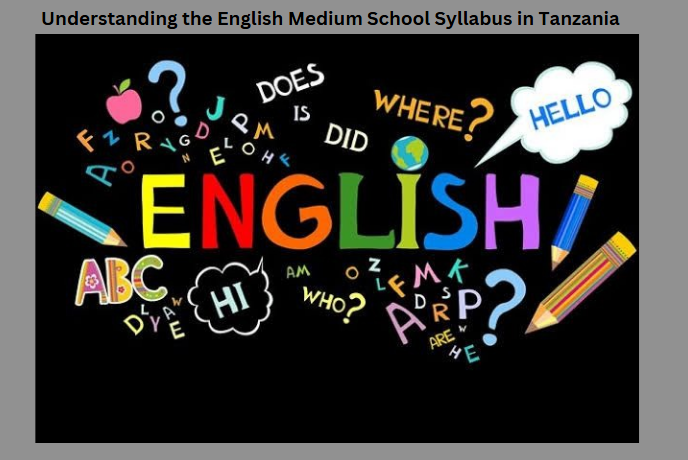Understanding the English Medium School Syllabus in Tanzania; Education plays a crucial role in shaping the future of any nation. In Tanzania, the language of instruction in most schools is Swahili.
However, in recent years, there has been a growing number of English medium schools, especially in urban areas, where English is used as the primary language of teaching. English medium schools offer an alternative educational experience, where students learn most subjects in English.
This blog post explores the English medium school syllabus in Tanzania, how it differs from the Swahili medium syllabus, and why it is becoming an increasingly popular choice for many parents.

What is an English Medium School?
An English medium school is a school where English is used as the main language of instruction. In these schools, students are taught all or most of their subjects in English, including subjects like mathematics, science, social studies, and even languages.
English medium schools can be both private and public, although private schools are more common in Tanzania.
These schools often follow a syllabus that aligns with international standards or a modified version of the Tanzanian syllabus that includes English as the primary language of instruction.
The primary aim of these schools is to ensure that students become fluent in English, which is often considered an essential skill for success in Tanzania and globally.
The English Medium School Syllabus in Tanzania
The English medium school syllabus in Tanzania is designed to help students achieve fluency in English while also mastering a wide range of academic subjects. The syllabus is structured to develop students’ abilities in reading, writing, listening, and speaking, along with enhancing their knowledge of various subjects.
Key Features of the English Medium School Syllabus
- English Language Proficiency: Since English is the medium of instruction, the syllabus emphasizes the development of strong English language skills. Students are taught not only to read and write but also to communicate effectively in both written and spoken English. This includes expanding their vocabulary, understanding grammar, and developing the ability to think and express themselves clearly in English.
- Core Subjects in English: In English medium schools, core subjects like Mathematics, Science (including Biology, Physics, and Chemistry), Social Studies, and Geography are taught in English. This helps students become comfortable using academic English, which is essential for higher education, especially in universities where English is the primary language of instruction.
- Focus on International Standards: The syllabus is often designed to meet international educational standards, which means it is aligned with curricula used in other countries, such as the Cambridge or International Baccalaureate (IB) systems. This helps ensure that Tanzanian students who graduate from English medium schools are well-prepared for further studies in international institutions.
- Literature in English: English medium schools place significant emphasis on English literature. Students read novels, plays, and poems by renowned authors from both English-speaking and non-English-speaking countries. This exposure to different literary styles and cultural perspectives helps students develop critical thinking skills and a deeper understanding of the world.
- Use of Technology in Education: English medium schools often incorporate technology into their teaching methods. This can include the use of educational software, online resources, and multimedia tools that support both learning the English language and other subjects. Technology also plays a role in enhancing students’ digital literacy, which is an important skill in today’s world.
- Global Perspective: The English medium syllabus aims to prepare students for a globalized world. With English being the dominant language in international communication, business, and academia, students who attend English medium schools are better equipped to interact with people from different parts of the world and to pursue higher education and career opportunities internationally.
Structure of the English Medium School Syllabus
The English medium school syllabus in Tanzania is generally divided into three main stages:
- Primary School (Standard 1–7): In the primary school phase, the focus is on building a strong foundation in English. Students learn to read and write in English, with subjects like Mathematics, Science, and Social Studies being taught in English. The syllabus includes basic grammar, vocabulary, and sentence construction, as well as an introduction to simple literature.
- Secondary School (Form 1–4): In secondary school, students continue to study all subjects in English, with a more advanced focus on developing both academic language skills and subject knowledge. At this level, students are introduced to more complex concepts in subjects like Chemistry, Physics, and History. The syllabus also includes more in-depth study of English literature, including classic novels, poetry, and plays.
- Advanced Level (Form 5–6): At the advanced level, students specialize in a few subjects of their choice, which are taught in English. This is where the curriculum becomes even more focused, and students are expected to demonstrate a higher level of proficiency in English. They engage in more detailed research, writing, and analysis, especially in their chosen areas of study.
Key Skills Developed Through the English Medium School Syllabus
- Communication Skills: Students in English medium schools develop strong communication skills, which are essential both for academic success and for functioning in society. These skills include reading comprehension, effective writing, public speaking, and listening.
- Critical Thinking: The syllabus encourages students to analyze and evaluate information, think critically, and express their opinions clearly. This helps them to become independent thinkers who are capable of solving problems and making informed decisions.
- Language Skills: As English is the language of instruction, students are constantly exposed to English in both academic and social contexts. This constant exposure improves their vocabulary, grammar, writing, and pronunciation, making them fluent speakers and writers of English.
- Cultural Awareness: Through the study of English literature and interactions with diverse people, students gain an understanding of different cultures and perspectives. This global awareness is an essential skill in an increasingly interconnected world.
- Research and Analytical Skills: In the advanced levels of schooling, students engage in research projects and analytical tasks that help them develop skills in gathering information, analyzing it, and presenting their findings in a clear and organized manner.
Advantages of Attending an English Medium School in Tanzania
- Better Prepared for Global Opportunities: As English is the global language of business, science, and academia, students who are proficient in English have access to a wider range of opportunities both locally and internationally. They are more likely to succeed in higher education institutions around the world and in global job markets.
- Improved Academic Performance: English medium schools tend to offer a more rigorous academic experience, with a focus on intellectual development and academic excellence. Students in these schools often perform better in national and international exams.
- Access to International Education: Students who attend English medium schools are better equipped to pursue international education, whether through scholarships, exchanges, or enrolling in universities abroad. The ability to study in English gives them a competitive edge in the global education system.
- Increased Career Opportunities: Proficiency in English opens up a wide range of career opportunities, both in Tanzania and internationally. Many multinational companies and organizations require employees who are fluent in English, and having strong English language skills can be a key factor in securing a job.
Conclusion
The English medium school syllabus in Tanzania provides students with a comprehensive education that not only builds proficiency in the English language but also prepares them for the demands of higher education and the global workforce.
With a strong focus on developing communication, critical thinking, and research skills, English medium schools offer an education that equips students to succeed in an increasingly interconnected world.
Related articles
- Science Subject in the Tanzanian Syllabus: Building Foundations for Innovation
- Science Subject in Tanzania: An Overview
- Mathematics Syllabus for Primary School in Tanzania-elimuhuru
- History of Mathematics in Tanzania-elimuhuru
- Top 10 Best Private Secondary Schools in Tanzania-Elimuhuru
- Top 50 Best Secondary Schools in Tanzania-Elimuhuru
- Education system in tanzania 2024-Elimuhuru
- Tanzania Education Statistics-Elimuhuru
- Scholarships in Tanzanian Universities-Elimuhuru
- Tanzania school fees: A Guide for Parents and Students
- International School of Tanganyika Fees-Elimuhuru
- Ahmes Secondary School Fees-Elimuhuru


